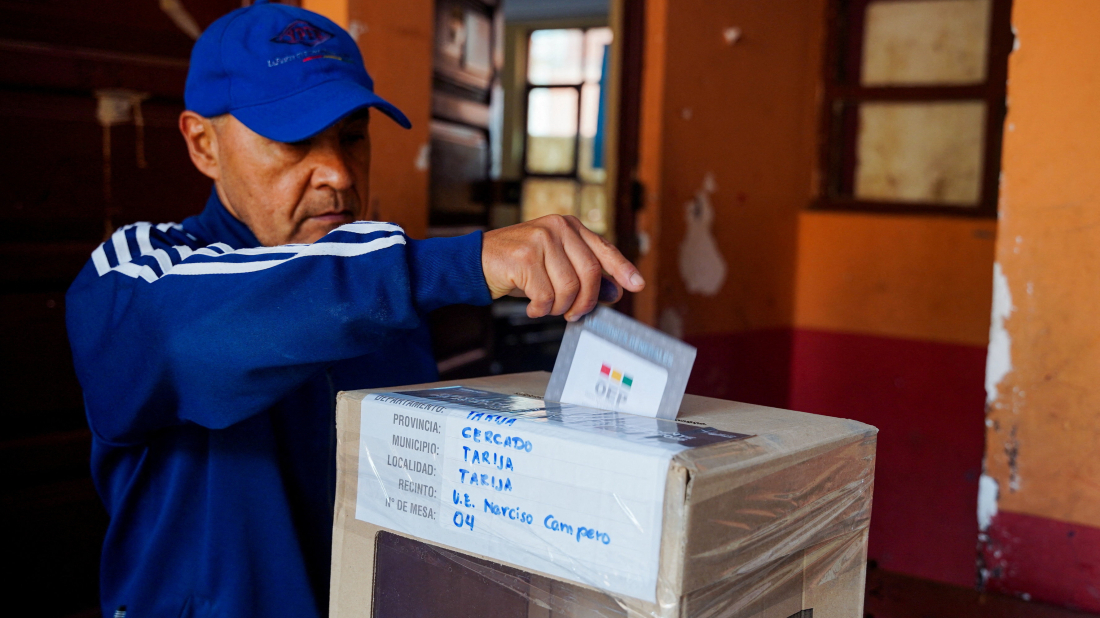U.S. taps Mark Savaya as Special Envoy to Iraq
On October 19, 2025, President Donald Trump announced the appointment of Mark Savaya, a Michigan-based entrepreneur, as the U.S. Special Envoy to Iraq...

Polls in Bolivia closed on Sunday, with voters awaiting the results of a presidential runoff that marks a significant rejection of the socialist government and points towards a potential shift in foreign policy, likely steering towards the United States after years of tense relations.
The race pits centrist Senator Rodrigo Paz against conservative former president Jorge "Tuto" Quiroga. Both candidates have committed to strengthening diplomatic ties with Washington, which have been strained since 2009, and are seeking U.S.-backed financial assistance to stabilise Bolivia’s fragile economy. Initial results are expected after 9 p.m. (01:00 GMT).
The runoff between two pro-market candidates from privileged backgrounds signals a profound shift for Bolivia, following two decades of dominance by the left-wing Movement for Socialism (MAS) party, founded by Evo Morales, once supported by the country's Indigenous majority.
Observers from the Organisation of American States (OAS) reported that voting proceeded smoothly on Sunday. The winner is set to take office on November 8.
For some voters, the two finalists mirror the conservative governments of the 1990s, which championed privatisation and close ties with the United States. Morales, Bolivia's first Indigenous president, who took office in 2006, sought alliances with Cuba, Venezuela, and Russia, and nationalised the country’s oil and gas industry.
"This election marks a political turning point," said Glaeldys Gonzalez Calanche, an analyst for the Southern Andes at the International Crisis Group. "Regardless of the outcome, Bolivia is heading in a new direction," she said.
Quiroga has promised "radical change," including significant cuts to public spending and the closure or privatisation of loss-making state-owned companies. Paz advocates for a more gradual approach, maintaining social programmes for the poor while encouraging private-sector growth.
Opinion polls show Quiroga with a slight lead. A September Ipsos survey gave him 47% support compared to Paz’s 39%, although Paz outperformed expectations in the first round of voting in August.
Voters seek economic change
In late September, Paz announced plans for a $1.5 billion economic cooperation deal with U.S. officials to ensure fuel supplies, while Quiroga is pushing for a $12 billion international bailout supported by multilateral lenders.
U.S. Secretary of State Marco Rubio said this week that both candidates "want stronger, better relations with the United States" after decades of anti-American leadership. "This election is a transformative opportunity," he said on Wednesday.
Some Bolivians have expressed concerns about potential austerity measures, similar to those in neighbouring Argentina under President Javier Milei. However, Paz has rejected drastic spending cuts, while Quiroga insists his policies will benefit ordinary Bolivians.
Support for the Movement for Socialism has nearly collapsed since the first round of voting.
Inflation has surged to 23% since the start of the year, while fuel and dollar shortages have severely hampered consumer demand. Natural gas exports, once Bolivia’s economic backbone, have dwindled, putting strain on the boliviano currency and limiting fuel imports.
In La Paz's commercial district, appliance stores are shuttered and shops are empty.
"There are months with zero sales," said Mercedes Quisbert, head of the local Importers' Association. Up until this year, shopkeepers and street vendors had managed to survive the crisis, but not anymore.
Bolivia has one of Latin America's highest rates of informal employment, with around 84% of the population working outside the formal labour market, according to official figures. Millions rely on buying and selling goods to make a living.
"We're basically surviving," said Marcela Martinez, 52, as she compared prices at a market in La Paz. She was planning to vote for Paz on Sunday. "We need new people to come in."
At least 69 people have died and almost 150 injured following a powerful 6.9-magnitude earthquake off the coast of Cebu City in the central Visayas region of the Philippines, officials said, making it one of the country’s deadliest disasters this year.
A tsunami threat was issued in Chile after a magnitude 7.8 earthquake struck the Drake Passage on Friday. The epicenter was located 135 miles south of Puerto Williams on the north coast of Navarino Island.
The war in Ukraine has reached a strategic impasse, and it seems that the conflict will not be solved by military means. This creates a path toward one of two alternatives: either a “frozen” phase that can last indefinitely or a quest for a durable political regulation.
A shooting in Nice, southeastern France, left two people dead and five injured on Friday, authorities said.
Snapchat will start charging users who store more than 5GB of photos and videos in its Memories feature, prompting backlash from long-time users.
On October 19, 2025, President Donald Trump announced the appointment of Mark Savaya, a Michigan-based entrepreneur, as the U.S. Special Envoy to Iraq.
Tufan Erhurman, a centre-left moderate, won the Turkish Cypriot presidential election on Sunday, defeating incumbent hardliner Ersin Tatar in a pivotal vote that could revive stalled U.N.-backed reunification talks on the divided island of Cyprus.
U.S. President Donald Trump urged Ukrainian President Volodymyr Zelenskyy during a White House meeting on Friday to accept Russia’s conditions for ending the conflict between Russia and Ukraine, warning that Vladimir Putin had threatened to “destroy” Ukraine if it refused to comply, according to FT.
Countries criticized UK, France, Germany for ‘legally and procedurally flawed’ attempt to trigger ‘snapback mechanism’
The Metropolitan Police said on Sunday that it is “actively” looking into media reports that Prince Andrew attempted to obtain personal information about his late accuser, Virginia Giuffre, through his police protection officers.
You can download the AnewZ application from Play Store and the App Store.

What is your opinion on this topic?
Leave the first comment